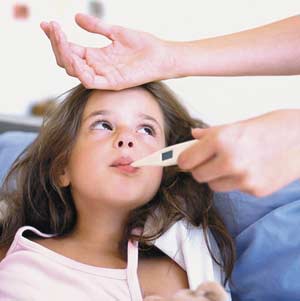Definition:
* Vomiting is the forceful emptying (throwing up) of a large portion of the stomach’s contents through the mouth
* Nausea and abdominal discomfort usually precede each bout of vomiting
Causes:
* Main Cause: Stomach infection (gastritis) from a stomach virus (eg, rotavirus). The illness starts with vomiting but diarrhea usually follows within 12 to 24 hours.
* Food poisoning from toxins produced by bacteria growing in poorly refrigerated foods (eg, Staphylococcus toxin in egg salad, Bacillus cereus toxin in rice dishes)
* Serious Causes: If vomiting persists as an isolated symptom (without diarrhea) for more than 24 hours, more serious causes must be considered. Examples are appendicitis, kidney infection, meningitis, and head injury.
* Vomiting can also be triggered by hard coughing. This is common, especially in children with reflux.
Severity of Vomiting:
Te following is an arbitrary attempt to classify vomiting by risk for dehydration:
* Mild: 1 to 2 times a day
* Moderate: 3 to 7 times a day
* Severe: Vomits everything or nearly everything, or 8 or more times a day
* Severity relates even more to the length of time that the particular severity level has persisted. At the beginning of a vomiting illness (especially following food poisoning), it’s common for a child to vomit everything for 3 or 4 hours and then become stable with mild or moderate vomiting.
* The younger the child, the greater the risk for dehydration
Return to School: Your child can return to child care or school after vomiting and fever are gone
 Call 911 Now (Your Child May Need an Ambulance) If:
Call 911 Now (Your Child May Need an Ambulance) If:
* Unresponsive or difficult to awaken
* Not moving or too weak to stand
Call Your Doctor Now (or in Alberta, canada call 780-408-LINK) If:
* Your child looks or acts very sick
* Confused (delirious)
* Stiff neck or bulging soft spot
* Headache
* Signs of dehydration (very dry mouth, no tears, and no urine in more than 8 hours)
* Blood in the vomit that’s not from a nosebleed
* Bile (bright yellow or green) in the vomit
* Abdominal pain is also present (EXCEPTION: Abdominal pain or crying just before and improved by vomiting is quite common)
* Appendicitis suspected (eg, pain low on right side, won’t jump, prefers to lie still)
* Diabetes suspected (excessive drinking, frequent urination, weight loss)
* Poisoning with a plant, medicine, or other chemical suspected
* Child is younger than 12 weeks with vomiting 2 or more times (EXCEPTION: spitting up)
* Receiving Pedialyte (or clear fluids if older than 1 year) and vomits everything longer than 8 hours
* High-risk child (eg, diabetes mellitus, abdominal injury, head injury)
* Weak immune system (eg, sickle cell disease, HIV, chemotherapy, organ transplant, chronic steroids)
* Vomiting an essential medicine
* Fever above 104°F (40°C) and not improved 2 hours after fever medicine
* Child is younger than 12 weeks with fever above 100.4°F (38.0°C) rectally (CAUTION: Do NOT give your baby any fever medicine before being seen)
Call Your Doctor Within 24 Hours (Between 9:00 am and 4:00 pm) If:
* You think your child needs to be seen
* Has vomited longer than 24 hours
* Fever present for more than 3 days
* Fever returns after gone for longer than 24 hours
Call Your Doctor During Weekday Office Hours If:
* You have other questions or concerns
* Vomiting is a recurrent chronic problem
Parent Care at Home If:
* Mild to moderate vomiting (probably viral gastritis) and you don’t think your child needs to be seen
 Home Care Advice for Vomiting:
Home Care Advice for Vomiting:
1. Reassurance:
* Most vomiting is caused by a viral infection of the stomach or mild food poisoning
* Vomiting is the body’s way of protecting the lower intestinal tract
* Fortunately, vomiting illnesses are usually brief
2. For Bottle-fed Infants, Offer Oral Rehydration Solution (ORS) for 8 Hours:
* ORS (eg, Pedialyte, store brand) is a special electrolyte solution that can prevent dehydration. It’s readily available in supermarkets and drugstores.
* For vomiting once, continue regular formula
* For vomiting more than once, offer ORS for 8 hours. If ORS is not available, use formula.
* Spoon or syringe feed small amounts of ORS —1 to 2 teaspoons (5 to 10 mL) every 5 minutes.
* After 4 hours without vomiting, double the amount
* After 8 hours without vomiting, return to regular formula
* For infants older than 4 months, also return to cereal and strained bananas
* Return to normal diet in 24 to 48 hours
3. For Breastfed Infants, Reduce the Amount Per Feeding:
* If infant vomits once, nurse 1 side every 1 to 2 hours
* If infant vomits more than once, nurse for 5 minutes every 30 to 60 minutes. After 4 hours without vomiting, return to regular breastfeeding.
* If infant continues to vomit, switch to ORS (eg, Pedialyte) for 4 hours
* Spoon or syringe feed small amounts of ORS —1 to 2 teaspoons (5 to 10 mL) every 5 minutes
* After 4 hours without vomiting, return to regular breastfeeding. Start with small feedings of 5 minutes every 30 minutes and increase as tolerated.
4. For Children Older Than 1 Year, Offer Small Amounts of Clear Fluids for 8 Hours:
* Water or ice chips are best for vomiting in older children (Reason: water is directly absorbed across the stomach wall)
* ORS: If child vomits water, offer ORS (eg, Pedialyte). If child refuses ORS, use half-strength Gatorade
* Give small amounts —2 to 3 teaspoons (10 to 15 mL) every 5 minutes
* Other Options: Half-strength flat lemon-lime soda, popsicles, or ORS frozen pops
* After 4 hours without vomiting, increase the amount
* After 8 hours without vomiting, return to regular fluids
* CAUTION: If vomiting continues for more than 12 hours, switch to ORS or half-strength Gatorade
* Solids: After 8 hours without vomiting, add solids
– Limit solids to bland foods. Starchy foods are easiest to digest
– Start with saltine crackers, white bread, cereals, rice, and mashed potatoes
– Return to normal diet in 24 to 48 hours
5. Avoid Medicines:
* Discontinue all nonessential medicines for 8 hours (Reason: usually make vomiting worse)
* Fever: Fevers usually don’t need any medicine. For higher fevers, consider acetaminophen (eg, Tylenol) suppositories. Never give oral ibuprofen (eg, Advil); it is a stomach irritant
* Call your doctor if your child is vomiting an essential medicine
6. Sleep: Help your child go to sleep for a few hours (Reason: sleep often empties the stomach and relieves the need to vomit). Your child doesn’t have to drink anything if she feels very nauseated.
7. Contagiousness: Your child can return to child care or school after vomiting and fever are gone.
8. Expected Course: Vomiting from viral gastritis usually stops in 12 to 24 hours. Mild vomiting with nausea may last up to 3 days
9. Call Your Doctor If:
* Vomiting becomes severe (vomits everything) longer than 8 hours
* Vomiting persists longer than 24 hours
* Signs of dehydration
* Your child becomes worse
Based on recommendations/advice in “My Child is Sick; Expert Advice for Managing Common Illnesses and Injuries”, 14th Edition, by Barton D. Schmitt





 I am borrowing this slogan from an advertising campaign in which we are trying to educate the public that most infections are caused by viruses and not bacteria. The distinction is important, since antibiotics only work against bacterial infections. Most infections however, are caused by bugs known as “viruses” and these are the diseases that we need to fight off ourselves. We can use medicines for support, but not to “cure” infections caused by viruses.
I am borrowing this slogan from an advertising campaign in which we are trying to educate the public that most infections are caused by viruses and not bacteria. The distinction is important, since antibiotics only work against bacterial infections. Most infections however, are caused by bugs known as “viruses” and these are the diseases that we need to fight off ourselves. We can use medicines for support, but not to “cure” infections caused by viruses.